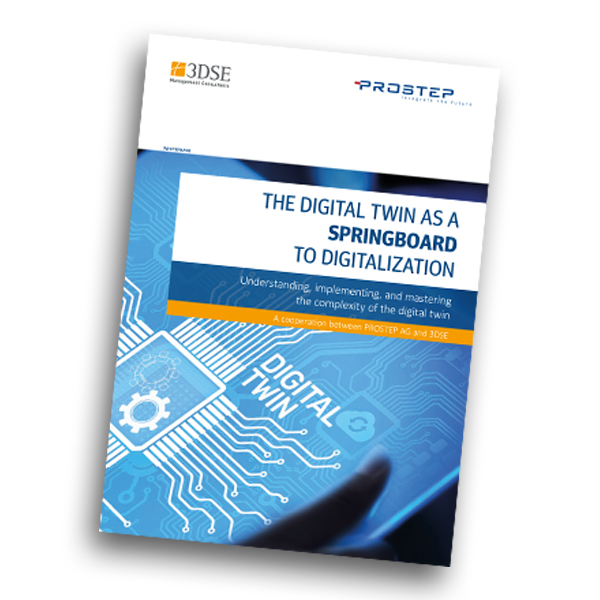
|
End-to-end digitalization is determined by the digital twinBy Karsten Theis The digital twin is an important, if not the most important, enabler for the digital transformation of business processes and the development of data-driven business models. This is why it is the focus of numerous digitalization initiatives in a wide range of industries. Companies however face a number of challenges when it comes to implementing the digital twin. One of these challenges, albeit not the biggest, is the fact that their existing PLM capabilities are most likely insufficient for this purpose and need to be expanded. 
Everyone is talking about the digital twin, or perhaps I should say almost everyone. At CLAAS, a manufacturer of agricultural technology, this term is not used to avoid alienating users with grand terms, as Kai Korthals explains in an interview with the PROSTEP Newsletter. For many companies, the term digital twin is still a buzzword that everyone takes to mean something different. Even in the shipbuilding industry, despite its many digital twin projects, there is still no common industry-wide understanding of what a digital twin is, as indicated by a recent survey conducted by PROSTEP. A concept study that we prepared together with 3DSE for Airbus Defense & Space significantly sharpened my understanding of the digital twin. The findings have been incorporated in a white paper that I recommend you read. A key insight is that there is, or should be, something along the lines of a generic digital twin that accompanies the product or production system throughout all the phases of its lifecycle – from its as-designed/planned/manufactured through to its as-operated/maintained state. 
The phase-specific configurations of the digital twin have a shared data basis, which is also used to derive configurations for the use cases to be supported. Creating a special digital twin for each use case would not be a viable solution as it would create isolated solutions and data silos. The aim must be to keep the digital twin as redundancy-free as possible across all products and variants, which is why it places much more demanding requirements on configuration management. From the very start, we need to think about how we can weave the digital twin from the digital thread. I would even go so far as to turn the tables and say that it is ultimately the digital twin that determines the requirements when it comes to end-to-end digitalization. It determines which information we need to link for which use case and with which level of granularity. In my opinion, approaches based on data lakes do not work. It must be possible for field data collected while a product is being used to be connected to the correct development data in a transparent manner. Establishing relationships at a later date using semantic searches or AI results is, at most, an 80% solution and always prone to errors. The key requirement for the digital twin is access to the "core data" in its "atomic" form. (See white paper) This means that we need to move away from file-based product lifecycle management toward granular access to all the information objects in the product development process. Freezing a bunch of documents at specific baselines might improve auditability, but it is no digital twin. Developers need to know the relationships between individual objects, for example in order to understand what impact changing a requirement will have on a particular function, on the costs, on the manufacturing process, etc. Knowing which circuit diagram is affected is of no help because hundreds of functions can be described in a single circuit diagram. No PLM concept today provides appropriate support, neither in terms of technology nor methodologically. Extending the PLM concept to include additional PLM capabilities is therefore an essential prerequisite for the digital twin and one of the challenges that Airbus is addressing with its Shared digital Enterprise Services. However, the biggest obstacles standing in the way of digital twin initiatives are not of a technical nature. For one thing, the companies have their own "fiefdoms" with separate system structures and methodology, which in the short term enjoy no direct benefit from end-to-end digitalization at cross-domain level. The initiative should therefore be driven forward in a strategic manner by someone above domain level. In addition, many companies today make a lot of money from service-related activities. A digital twin that results in customers needing fewer services is to a certain extent counterproductive. A major problem when it comes to end-to-end digitalization from development through to operation is the change of ownership of the physical product. As a result, manufacturers no longer have access, or only limited access, to the operating data that would allow them to gain insight into product behavior. Offering your products as a service provides an elegant solution to this problem. But you might not want to wait that long before you launch your digital twin initiative. We recommend that you tackle concrete projects that offer economic added value as soon as possible. PROSTEP can provide you with effective support in this context. We have the required expertise and a wealth of experience implementing digital twin concepts in a variety of different industries. 
|
|
| © PROSTEP AG | ALL RIGHTS RESERVED | IMPRINT | PRIVACY STATEMENT | YOU CAN UNSUBSCRIBE TO THE NEWSLETTER HERE. |

